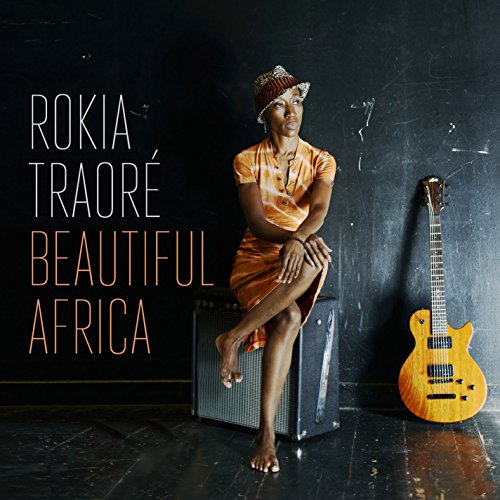
Rokia Traoré
Beautiful Africa
Release Date: Apr 8, 2013
Genre(s): International
Record label: Nonesuch
Music Critic Score
How the Music Critic Score works
Buy Beautiful Africa from Amazon
Album Review: Beautiful Africa by Rokia Traoré
Fantastic, Based on 6 Critics
Based on rating 5/5
This is the most commercial, rock-influenced album to date by Africa's most inventive singer-songwriter, and it's dominated by sturdy riffs and bass lines. Rokia Traoré has always set out to surprise, and by choosing to work with John Parish, the producer and guitarist best known for his work with PJ Harvey, she has moved away from the acoustic or blues influences of her other recent projects. But this is still a distinctively African album, partly sung in Bambara, and with the n'goni as dominant as the guitars.
Based on rating 5/5
Ever the shape-shifter, Malian diva Rokia Traoré has previously mixed it with such western influences as the Kronos Quartet. That this fifth outing embraces rock is no shock given her guitar playing (she grew up a Dire Straits fan), but it's a startling record nonetheless, with producer John Parish (of PJ Harvey reknown) pitching Traoré's agile voice against restless guitars and Seb Rochford's mercurial drumming. There are many moods; the title track's impassioned plea for her homeland, a gentle paean to African women on Sarama, the soukous-style Tuit Tuit, the spartan N'Teri and the urgent rock-out of Kouma.
Based on rating 4.5
Whilst this is not the first time the superb Malian singer-songwriter Rokia Traoré has worked with a western production team, Beautiful Africa does seem to sit very comfortably alongside a string of albums now emerging from West Africa. Ngoni superstar Bassekou Kouyate worked with Arcade Fire producer Howard Bilerman on his fantastic Jama Ko album, whilst Bombino has just released Nomad, a recording produced by the alchemical hand of Dan Auerbach of The Black Keys. Traoré’s Beautiful Africa, her first album since 2008”s sublime Tchamantche, was recorded in Bristol with British musician and producer John Parish, perhaps best known for his work with PJ Harvey.
Based on rating 8.1/10
The first thing you hear on Rokia Traoré's Beautiful Africa is a drum beat, unadorned. It only lasts a few seconds before the guitars wrap around it like a veil, but it still feels revealing, as though we opened the door on the music just a few seconds before it was ready for us. That thump and tap, in a rhythm a bit like Radiohead’s “Idioteque,” tells us a lot about the album that follows: This is a record that grooves but also invites the listener to come closer, to step into its space, be still and listen.
Based on rating 8/10
On Beautiful Africa, Malian songwriter and guitar slinger Rokia Traoré unleashes the fiery rocker she's been nurturing since her teens. On four previous offerings she established herself as a wildly inventive and diverse songwriter, most notably on 2008's Tchamantché. She recorded this set with producer John Parish in the U.K. He keeps her guitar and the n'goni right up front in his mix, just underneath her distinctive, supple voice.
Opinion: Excellent
Factory Floor FACTORY FLOOR “Factory Floor” (DFA), the self-titled debut album by an English electronic trio, is a present-day blast from an austere past. At the end of the 1970s, the combination of art-punk aesthetics, primitive electronic instruments, do-it-yourself budgets and a British recession spawned dance music that prided itself on using a few brittle, melody-defying sounds — the fewer the better — to get dance floors moving. Even then, the music had an abstinent spirit, proudly renouncing easy pleasures.
'Beautiful Africa'
is available now

